How well do you know yourself? คุณรู้จักตัวเองดีแค่ไหน?
If you’re like most people, you probably have a decent idea about your own desires, values, beliefs, and opinions. หากคุณเป็นเหมือนคนส่วนใหญ่ คุณอาจมีความคิดที่ดีเกี่ยวกับความปรารถนา ค่านิยม ความเชื่อ และความคิดเห็นของคุณเอง
You have a personal code that you choose to follow that dictates whether you are being a “good” person. คุณมีรหัสส่วนตัวที่คุณเลือกปฏิบัติตามซึ่งกำหนดว่าคุณเป็น "คนดี" หรือไม่
If there is any one thing you can know in this universe, surely it is who you are.หากมีสิ่งหนึ่งที่คุณสามารถรู้ได้ในจักรวาลนี้ แน่นอนว่านั่นคือตัวตนของคุณ
But what if you’re wrong?แต่ถ้าคุณคิดผิดล่ะ?
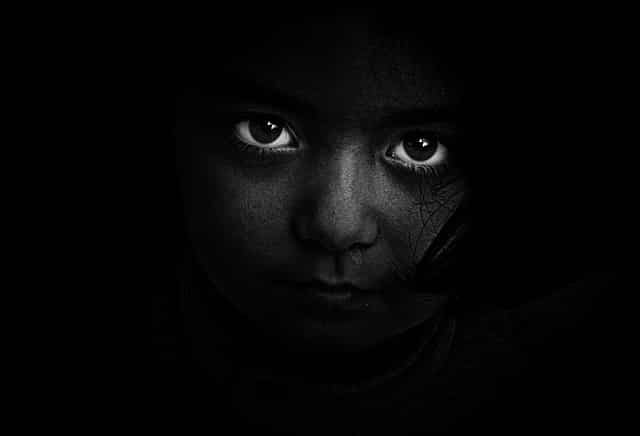
What if much of what you have come to believe about yourself, your morality, and what drives you is not an accurate reflection of who you truly are?จะเป็นอย่างไรถ้าสิ่งที่คุณเชื่อเกี่ยวกับตัวเอง ศีลธรรมของคุณ และสิ่งที่ผลักดันคุณนั้นไม่ได้สะท้อนถึงตัวตนที่แท้จริงของคุณอย่างถูกต้องล่ะ?
Now, before you launch into a, “Hey, you don’t know me, you don’t know my life, you don’t know what I’ve been through!”-style defence, ponder this for a second:ตอนนี้ ก่อนที่คุณจะเริ่มพูดว่า “เฮ้ คุณไม่รู้จักฉัน คุณไม่รู้จักชีวิตของฉัน คุณไม่รู้ว่าฉันผ่านอะไรมาบ้าง!” - สไตล์การป้องกัน ลองคิดดูสักครู่:
Have you ever said or done something really shitty, mostly on an impulse, that you later regretted? คุณเคยพูดหรือทำอะไรที่เลวร้ายจริงๆ ซึ่งส่วนใหญ่เป็นเพราะแรงกระตุ้นจนทำให้คุณเสียใจในภายหลังหรือไม่?
After the damage was done and the other person involved was hurt, you couldn’t bury your shame fast enough. “Why did I say that?” you might have asked yourself in frustration.หลังจากความเสียหายเสร็จสิ้นและบุคคลอื่นที่เกี่ยวข้องได้รับบาดเจ็บ คุณไม่สามารถฝังความอับอายของคุณได้เร็วพอ “ทำไมฉันถึงพูดแบบนั้น” คุณอาจจะถามตัวเองด้วยความหงุดหงิด
It’s that “Why?” question that indicates the presence of a blind spot. And though the reason for your reaction may have been obvious (perhaps even “justified”), the lack of control you had over yourself betrays the existence of a different person lurking beneath your carefully constructed idea of who you are. มันคือ “ทำไม” คำถามที่บ่งบอกถึงการมีอยู่ของจุดบอด และแม้ว่าสาเหตุของปฏิกิริยาของคุณอาจชัดเจน (บางทีอาจ "สมเหตุสมผล") การขาดการควบคุมตัวเองเป็นการทรยศต่อการดำรงอยู่ของบุคคลอื่นที่ซ่อนตัวอยู่ใต้แนวคิดที่สร้างขึ้นอย่างรอบคอบว่าคุณเป็นใคร
If this person is coming into focus for you, congratulations—you’ve just met your shadow self. หากบุคคลนี้เข้ามาสนใจคุณ ยินดีด้วย คุณเพิ่งพบเงาของตัวเองแล้ว
The Shadow: A Formal Introductionเงา: บทนำอย่างเป็นทางการ
— Carl Jung, Aion (1951)
“เงาเป็นปัญหาทางศีลธรรมที่ท้าทายอัตตาบุคลิกภาพ เพราะไม่มีใครสามารถตระหนักถึงเงาได้โดยไม่ต้องใช้ความพยายามทางศีลธรรมมากนัก การตระหนักถึงสิ่งนี้เกี่ยวข้องกับการตระหนักถึงด้านมืดของบุคลิกภาพในปัจจุบันและเป็นจริง การกระทำนี้เป็นเงื่อนไขที่จำเป็นสำหรับการรู้จักตนเองทุกประเภท”
— คาร์ล จุง, เอออน (1951)
The “shadow” is a concept first coined by Swiss psychiatrist Carl Jung that describes those aspects of the personality that we choose to reject and repress. For one reason or another, we all have parts of ourselves that we don’t like—or that we think society won’t like—so we push those parts down into our unconscious psyches. It is this collection of repressed aspects of our identity that Jung referred to as our shadow self.“เงา” เป็นแนวคิดที่ริเริ่มโดยจิตแพทย์ชาวสวิส คาร์ล จุงซึ่งอธิบายถึงแง่มุมต่างๆ ของบุคลิกภาพที่เราเลือกที่จะปฏิเสธและอดกลั้น ด้วยเหตุผลใดก็ตาม เราทุกคนต่างก็มีส่วนหนึ่งของตัวเองที่เราไม่ชอบ—หรือที่เราคิดว่าสังคมจะไม่ชอบ—ดังนั้นเราจึงผลักส่วนเหล่านั้นลงไปในจิตใต้สำนึกของเราคอลเลกชันของแง่มุมที่อดกลั้นของตัวตนของเรานี้เองที่จุงเรียกว่าตัวตนเงาของเรา
If you’re one of those people who generally loves who they are, you might be wondering whether this is true of you. “I don’t reject myself,” you might be thinking. “I love everything about me.”หากคุณเป็นคนหนึ่งที่ชื่นชอบตัวตนที่เป็นตัวของตัวเอง คุณอาจจะสงสัยว่าสิ่งนี้เกิดขึ้นกับคุณจริงหรือไม่ “ ฉันไม่ปฏิเสธตัวเอง” คุณอาจจะกำลังคิด “ฉันรักทุกอย่างเกี่ยวกับตัวฉัน”
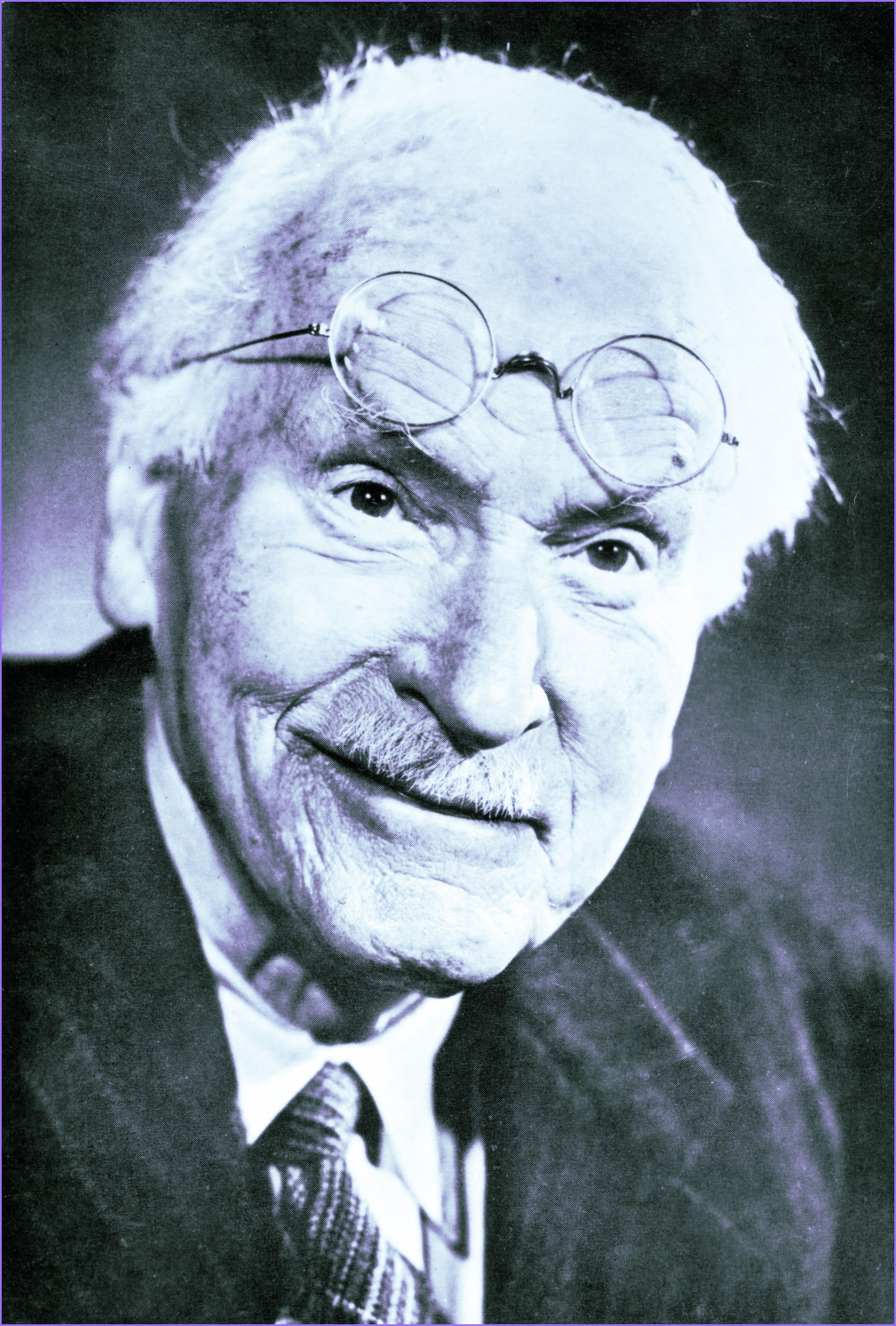
However, the problem is that you’re not necessarily aware of those parts of your personality that you reject. According to Jung’s theory, we distance ourselves psychologically from those behaviors, emotions, and thoughts that we find dangerous.
อย่างไรก็ตาม ปัญหาคือคุณไม่จำเป็นต้องตระหนักถึงส่วนต่างๆ ของบุคลิกภาพที่คุณปฏิเสธ ตามทฤษฎีของจุง เราตีตัวออกห่างจากพฤติกรรม อารมณ์ และความคิดที่เราพบว่าเป็นอันตรายในทางจิตวิทยา
Rather than confront something that we don’t like, our mind pretends it does not exist. Aggressive impulses, taboo mental images, shameful experiences, immoral urges, fears, irrational wishes, unacceptable sexual desires—these are a few examples of shadow aspects, things people contain but do not admit to themselves that they contain. Here are a few examples of common shadow behaviors: แทนที่จะเผชิญหน้ากับสิ่งที่เราไม่ชอบ จิตใจของเรากลับแสร้งทำเป็นว่ามันไม่มีอยู่จริงแรงกระตุ้นที่ก้าวร้าว รูปภาพทางจิตที่ต้องห้ามประสบการณ์ที่น่าละอาย แรงกระตุ้นที่ผิดศีลธรรม ความกลัว ความปรารถนาที่ไม่มีเหตุผล ความต้องการทางเพศที่ยอมรับไม่ได้ สิ่งเหล่านี้เป็นเพียงตัวอย่างเล็กๆ น้อยๆ ของแง่มุมเงา สิ่งต่าง ๆ ที่ผู้คนมีอยู่แต่ไม่ยอมรับกับตัวเองว่ามีสิ่งเหล่านี้ ต่อไปนี้คือตัวอย่างบางส่วนของลักษณะการทำงานของเงาทั่วไป:
1. A tendency to harshly judge others, especially if that judgment comes on an impulse. แนวโน้มที่จะตัดสินผู้อื่นอย่างรุนแรง โดยเฉพาะอย่างยิ่งหากการตัดสินนั้นเกิดขึ้นจากแรงกระตุ้น
You may have caught yourself doing this once or twice when you pointed out to a friend how “ridiculous” someone else’s outfit looked. Deep down, you would hate to be singled out this way, so doing it to another reassures you that you’re smart enough not to take the same risks as the other person.คุณอาจจับได้ว่าตัวเองทำสิ่งนี้ครั้งหรือสองครั้งเมื่อคุณชี้ให้เพื่อนเห็นว่าชุดของคนอื่นดู “ไร้สาระ” แค่ไหน ลึกๆ แล้ว คุณคงเกลียดที่ถูกแยกออกมาด้วยวิธีนี้ ดังนั้นการทำแบบนี้กับคนอื่นจะทำให้คุณมั่นใจว่าคุณฉลาดพอที่จะไม่เสี่ยงแบบเดียวกับอีกฝ่าย
2. Pointing out one’s own insecurities as flaws in another. ชี้ให้เห็นความไม่มั่นคงของตัวเองว่าเป็นข้อบกพร่องของอีกคนหนึ่ง
The internet is notorious for hosting this. Scan any comments section and you’ll find an abundance of trolls calling the author and other commenters “stupid,” “moron,” “idiot,” “untalented,” “brainwashed,” and so on. Ironically, internet trolls are some of the most insecure people of all. อินเทอร์เน็ตมีชื่อเสียงในการโฮสต์สิ่งนี้ สแกนส่วนความคิดเห็นใดๆ แล้วคุณจะพบกับพวกโทรลล์มากมายที่เรียกผู้เขียนและผู้แสดงความคิดเห็นคนอื่นๆ ว่า "โง่" "ปัญญาอ่อน" "งี่เง่า" "ไร้ความสามารถ" "ล้างสมอง" และอื่นๆ น่าแปลกที่โทรลล์ทางอินเทอร์เน็ตเป็นกลุ่มคนที่ไม่ปลอดภัยที่สุด
3. A quick temper with people in subordinate positions of power. อารมณ์ร้อนเร็วกับผู้อยู่ในตำแหน่งรองที่มีอำนาจ
I caught this one all the time when I worked as a cashier, and it is the bane of all customer service employees. People are quick to cop an attitude with people who don’t have the power to fight back. Exercising power over another is the shadow’s way of compensating for one’s own feelings of helplessness in the face of greater force. ฉันเจอสิ่งนี้ตลอดเวลาตอนที่ฉันทำงานเป็นแคชเชียร์ และนี่คือความหายนะของพนักงานบริการลูกค้าทุกคน ผู้คนรีบรับมือกับทัศนคติกับคนที่ไม่มีอำนาจที่จะตอบโต้ การใช้อำนาจเหนือผู้อื่นเป็นวิธีของเงาในการชดเชยความรู้สึกสิ้นหวังของตัวเองเมื่อเผชิญกับพลังที่มากขึ้น
4. Frequently playing the “victim” of every situation. มักเล่นเป็น “เหยื่อ” ทุกสถานการณ์
Rather than admit wrongdoing, people go to amazing lengths to paint themselves as the poor, innocent bystander who never has to take responsibility. แทนที่จะยอมรับการกระทำผิด ผู้คนพยายามอย่างเต็มที่เพื่อวาดภาพตัวเองว่าเป็นคนยากจนและไร้เดียงสาที่ไม่ต้องรับผิดชอบ
5. A willingness to step on others to achieve one’s own ends. ความเต็มใจที่จะเหยียบย่ำผู้อื่นเพื่อบรรลุเป้าหมายของตนเอง
People often celebrate their own greatness without acknowledging times that they may have cheated others to get to their success. You can see this happen on the micro level as people vie for position in checkout lines and cut each other off in traffic. On the macro level, corporations rig policy in their favor to gain tax cuts at the expense of the lower classes. ผู้คนมักเฉลิมฉลองความยิ่งใหญ่ของตนเองโดยไม่ยอมรับว่าตนเองอาจโกงผู้อื่นเพื่อให้บรรลุความสำเร็จ คุณสามารถเห็นสิ่งนี้เกิดขึ้นในระดับจุลภาคเมื่อผู้คนแย่งชิงตำแหน่งในจุดชำระเงินและตัดกันในเรื่องการจราจร ในระดับมหภาค บริษัทต่างๆ มักวางนโยบายเพื่อให้ได้มาซึ่งการลดภาษีโดยเสียค่าใช้จ่ายให้กับคนชั้นล่าง
6. Unacknowledged biases and prejudices. อคติและความรู้สึกที่ไม่มีเหตุผล ที่ไม่ได้รับการยอมรับ
People form assumptions about others based on their appearance all the time—in fact, it’s a pretty natural (and often useful—e.g. noticing signs of a dangerous person) thing to do. However, we can easily take this too far, veering into toxic prejudice. But with so much social pressure to eradicate prejudice, people often find it easier to “pretend” that they’re not racist/homophobic/xenophobic/sexist, etc., than to do the deep work it would take to override or offset particularly destructive stereotypes they may be harboring. ผู้คนตั้งสมมติฐานเกี่ยวกับผู้อื่นโดยดูจากรูปร่างหน้าตาของพวกเขาตลอดเวลา อันที่จริง มันเป็นสิ่งที่ค่อนข้างเป็นธรรมชาติ (และมักจะมีประโยชน์ เช่น การสังเกตสัญญาณของบุคคลอันตราย) ที่ต้องทำ อย่างไรก็ตาม เราสามารถทำสิ่งนี้ให้ไกลเกินไปได้อย่างง่ายดาย โดยหันเหไปสู่อคติที่เป็นพิษ แต่ด้วยความกดดันทางสังคมมากมายที่ต้องขจัดอคติ ผู้คนจึงมักพบว่าการ"เสแสร้ง" ทำได้ง่ายกว่าว่าตนไม่แบ่งแยกเชื้อชาติ/เกลียดกลัวคนรักร่วมเพศ/เกลียดกลัวชาวต่างชาติ/รังเกียจผู้หญิง ฯลฯ ง่ายกว่าการลงมือลึกเพื่อแก้ไขหรือชดเชยการทำลายล้างโดยเฉพาะ แบบเหมารวมที่พวกเขาอาจเก็บไว้
7. A messiah complex. พฤติกรรมที่คนคนหนึ่งมักต้องการช่วยเหลือผู้อื่น เพราะคิดอยู่เสมอว่า ตัวเขานั้นมีหน้าที่ที่จะช่วยเหลือคนอื่นตลอดเวลา
Some people think they’re so “enlightened” that they can do no wrong. They construe everything they do as an effort to “save” others—to help them “see the light,” so to speak. This is actually an example of spiritual bypassing, yet another manifestation of the shadow self. บางคนคิดว่าพวกเขา " รู้แจ้ง " มากจนไม่สามารถทำอะไรผิดได้ พวกเขาตีความทุกสิ่งที่พวกเขาทำว่าเป็นความพยายามที่จะ "ช่วย" ผู้อื่น - เพื่อช่วยให้พวกเขา "มองเห็นแสงสว่าง" นี่เป็นตัวอย่างหนึ่งของการเลี่ยงทางจิตวิญญาณแต่เป็นการสำแดงตัวตนในเงาอีกประการหนึ่ง
Projection: Seeing Our Darkness in Others การฉายภาพ: มองเห็นความมืดของเราในผู้อื่น
“If only it were all so simple! If only there were evil people somewhere insidiously committing evil deeds, and it were necessary only to separate them from the rest of us and destroy them. But the line dividing good and evil cuts through the heart of every human being. And who is willing to destroy a piece of his own heart?”
― Aleksandr Solzhenitsyn
“ถ้ามันจะง่ายขนาดนั้น! หากมีคนชั่วร้ายอยู่ที่ไหนสักแห่งที่กระทำการชั่วอย่างร้ายกาจและจำเป็นต้องแยกพวกเขาออกจากพวกเราที่เหลือและทำลายพวกเขาเท่านั้น แต่เส้นแบ่งความดีและความชั่วก็ตัดผ่านหัวใจของมนุษย์ทุกคน และใครเล่าจะเต็มใจที่จะทำลายหัวใจของเขาเอง?”
- อเล็กซานเดอร์ โซลซีนิทซิน
Seeing the shadow within ourselves is extremely difficult, so it’s rarely done—but we’re really good at seeing undesirable shadow traits in others. Truth be told, we revel in it. We love calling out unsightly qualities in others—in fact, the entire celebrity gossip industry is built on this fundamental human tendency. การมองเห็นเงาในตัวเราเป็นเรื่องยากมาก ดังนั้นจึงไม่ค่อยเกิดขึ้น แต่เราเก่งมากที่จะเห็นลักษณะเงาที่ไม่พึงประสงค์ของผู้อื่น บอกตามตรงว่าเรามีความสุขมากกับมัน เราชอบพูดถึงคุณสมบัติที่ไม่น่าดูในตัวผู้อื่น จริงๆ แล้วอุตสาหกรรมซุบซิบคนดังทั้งหมดถูกสร้างขึ้นจากแนวโน้มพื้นฐานของมนุษย์
Seeing in others what we won’t admit also lies within is what Jung calls “projection.” Although our conscious minds are avoiding our own flaws, they still want to deal with them on a deeper level, so we magnify those flaws in others. First we reject, then we project. การได้เห็นผู้อื่นในสิ่งที่เราไม่ยอมรับนั้นอยู่ภายในนั้นก็คือสิ่งที่จุงเรียกว่า " การฉายภาพ " แม้ว่าจิตสำนึกของเราจะหลีกเลี่ยงข้อบกพร่องของเราเอง แต่พวกเขายังคงต้องการจัดการกับข้อบกพร่องเหล่านั้นในระดับที่ลึกกว่า ดังนั้นเราจึงขยายข้อบกพร่องเหล่านั้นไปยังจุดบกพร่องอื่นๆขั้นแรกเราปฏิเสธ ject จากนั้นเราโปรเจ็กต์
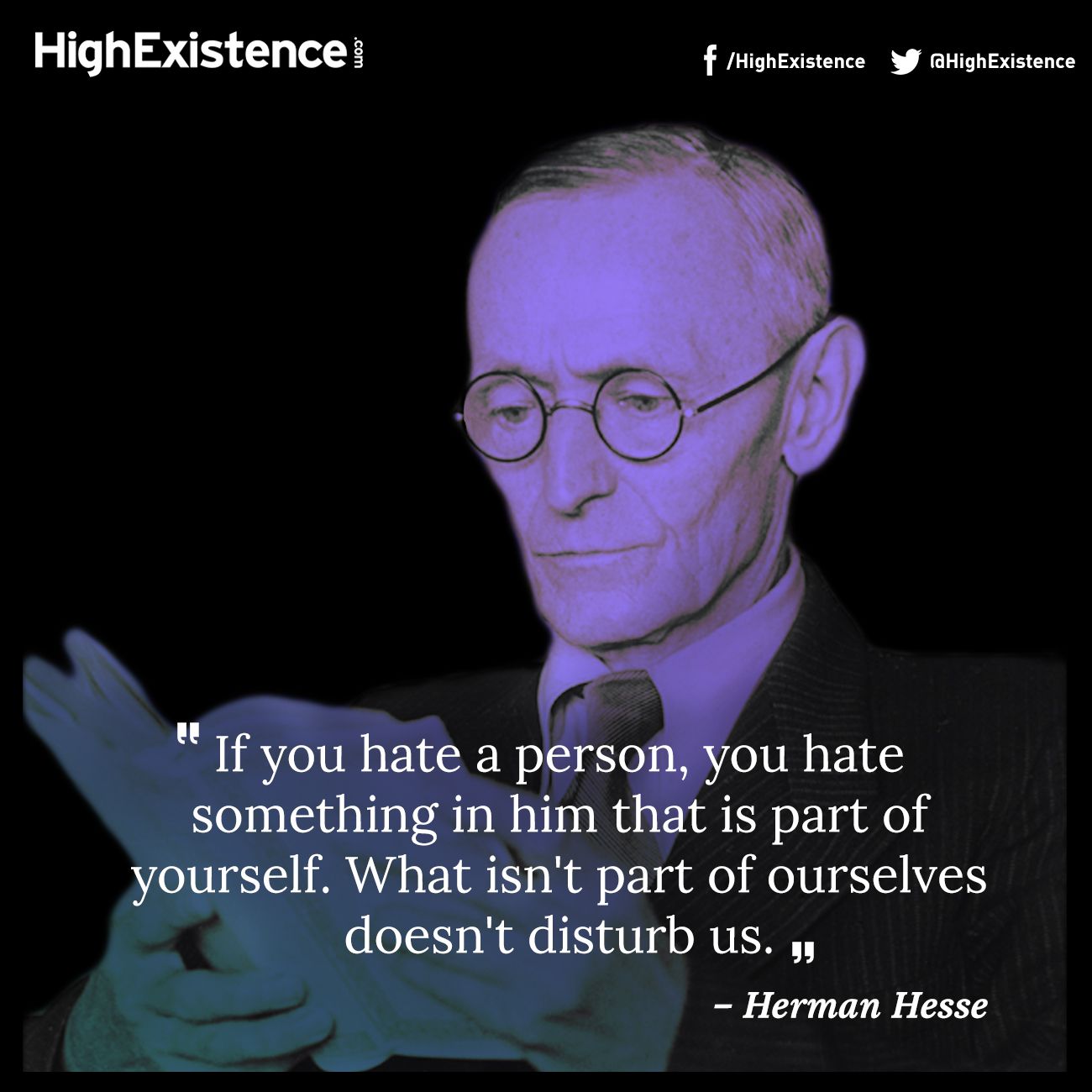
One way that we all experience this dichotomy of rejection and projection, for example, is when we have a hard time admitting that we’re wrong. วิธีหนึ่งที่เราทุกคนประสบกับการแบ่งขั้วของการปฏิเสธและการฉายภาพออกไป คือเมื่อเรามีช่วงเวลาที่ยากลำบากในการยอมรับว่าเราผิด
When I was seven, I had the grand idea that my younger brother and I would run away. Nothing was particularly unpleasant in our home lives at the time; when my brother asked why we were running away, I simply shrugged and said, “Because all the kids do it.” ตอนที่ฉันอายุเจ็ดขวบ ฉันมีความคิดที่ยิ่งใหญ่ว่าฉันจะกับน้องชายจะหนีไปไม่มีอะไรที่ไม่พึงประสงค์อย่างยิ่งในชีวิตบ้านของเราในเวลานั้น เมื่อพี่ชายถามว่าทำไมเราถึงวิ่งหนี ฉันก็ยักไหล่แล้วตอบว่า “เพราะเด็กทุกคนทำแบบนั้น”
We packed our blue Sesame Street suitcase with all the essentials: cookies, toys, and juice boxes. After taking the screen down from our first-story bedroom window, we tossed the suitcase onto the ground below. I urged my brother to jump out first and, with complete trust in me, he did. As he crouched behind the thorny hedge just beneath the window, I swung my leg outside and sat poised between the safety of my bedroom and the open air of the outside world. เราจัดกระเป๋าเดินทางสีน้ำเงินSesame Streetให้เต็มไปด้วยสิ่งของจำเป็นทั้งหมด: คุกกี้ ของเล่น และกล่องน้ำผลไม้ หลังจากนำฉากกั้นลงมาจากหน้าต่างห้องนอนชั้นแรก เราก็โยนกระเป๋าเดินทางลงบนพื้นด้านล่าง ฉันกระตุ้นให้น้องชายของฉันกระโดดออกไปก่อน และเขาก็ทำได้ด้วยความไว้วางใจในตัวฉันอย่างเต็มที่ ในขณะที่เขาหมอบอยู่หลังพุ่มไม้หนามใต้หน้าต่าง ฉันก็เหวี่ยงขาออกไปข้างนอกและนั่งอยู่ระหว่างความปลอดภัยของห้องนอนของฉันกับอากาศภายนอกของโลกภายนอก
I looked at the cars driving by, suddenly aware of the boundary I was about to cross. On one side of the window I was safe; my mom knew where I was and I was doing everything she expected me to. On the other side of the window, however, rules were being broken. If she knew that we were going outside without her knowledge, our mom would surely kill us. ฉันมองดูรถที่ขับผ่านไป ทันใดนั้นก็ตระหนักได้ถึงเขตแดนที่ฉันกำลังจะข้าม ด้านหนึ่งของหน้าต่างฉันปลอดภัย แม่ของฉันรู้ว่าฉันอยู่ที่ไหนและฉันก็ทำทุกอย่างที่เธอคาดหวัง อย่างไรก็ตาม อีกด้านหนึ่งของหน้าต่าง มีการละเมิดกฎ ถ้าเธอรู้ว่าเราจะออกไปข้างนอกโดยที่เธอไม่รู้ แม่ของเราจะฆ่าเราอย่างแน่นอน
This moment of panic inspired in me a sudden need to retreat into the safety zone. I called down to my brother, telling him that I had forgotten something and would be right back—instead I hurried to tell my mom that he was running away. She scrambled outside, where she found him in the bushes, still waiting for me. The look of betrayal contorted his features as he gaped at me, and I parried with a self-righteous stare. He was grounded, while I became his “savior.” ช่วงเวลาแห่งความตื่นตระหนกนี้กระตุ้นให้ฉันจำเป็นต้องล่าถอยเข้าสู่เขตปลอดภัยอย่างกะทันหัน ฉันโทรหาน้องชายและบอกเขาว่าฉันลืมอะไรบางอย่างและจะรีบกลับมา—แต่ฉันรีบบอกแม่ว่าเขากำลังจะหนีไป เธอรีบออกไปข้างนอก และพบเขาอยู่ในพุ่มไม้และยังคงรอฉันอยู่ ท่าทางของการทรยศทำให้ใบหน้าของเขาบิดเบี้ยวในขณะที่เขาอ้าปากค้างมาที่ฉัน และฉันก็หลบเลี่ยงด้วยการจ้องมองอย่างหยิ่งผยอง เขาถูกกักขัง ในขณะที่ฉันกลายเป็น “ผู้ช่วยให้รอด” ของเขา
While it’s easy to see my behavior as simply that of a shitty, mean sister (which, trust me, I have assured myself repeatedly that I was being), there was actually an entire invisible psychological process happening beneath the surface. As soon as I realized that my brother and I were doing something that wasn’t the fun and brazen endeavor I imagined and would actually land us in a massive heap of trouble, I had to devise a way to protect myself from the consequences. แม้ว่าพฤติกรรมของฉันจะเป็นเรื่องง่ายที่จะเห็นพฤติกรรมของพี่สาวใจร้ายและเลวทราม (ซึ่งเชื่อฉันเถอะ ฉันยืนยันตัวเองซ้ำแล้วซ้ำเล่า) แต่จริงๆ แล้วมีกระบวนการทางจิตวิทยาที่มองไม่เห็นทั้งหมดเกิดขึ้นใต้ผิวเผิน ทันทีที่ฉันรู้ว่าพี่ชายและฉันกำลังทำอะไรบางอย่างที่ไม่ใช่ความพยายามที่สนุกสนานและไร้ยางอายอย่างที่ฉันจินตนาการไว้ และจะทำให้เราต้องพบกับปัญหามากมายมหาศาล ฉันจึงต้องคิดหาวิธีป้องกันตัวเองจากผลที่ตามมา
My seven-year-old “big sister” ego identity wouldn’t permit me to admit that I was wrong—such an act would put my social status into question for me (and more importantly, my subservient little brother). Instead, I projected the wrongness onto my brother and ran to tell my mom. I suspect that my unconscious mind wanted to see the consequences of that wrongness played out in order to learn the lesson of how to avoid the trouble in the future… I just maybe didn’t want to experience those consequences for myself. อัตลักษณ์ "พี่สาว" วัยเจ็ดขวบของฉันไม่ยอมให้ฉันยอมรับว่าฉันผิด การกระทำดังกล่าวจะทำให้สถานะทางสังคมของฉันตั้งคำถามสำหรับฉัน (และที่สำคัญกว่านั้นคือน้องชายคนเล็กของฉัน) แต่ฉันกลับฉายภาพความผิดไปที่น้องชายแล้ววิ่งไปบอกแม่ ฉันสงสัยว่าจิตใต้สำนึกของฉันต้องการเห็นผลที่ตามมาของความผิดนั้นเพื่อที่จะเรียนรู้บทเรียนเกี่ยวกับวิธีหลีกเลี่ยงปัญหาในอนาคต… ฉันแค่อาจจะไม่ต้องการที่จะประสบกับผลที่ตามมาเหล่านั้นด้วยตัวเอง
By projecting the deviant behavior onto my poor little brother (whom, I assure you, I spoil to death in our older age as penance), I avoided having to confront the dangerous behavior in myself. And this is something that, in our own ways, we all do. ด้วยการฉายพฤติกรรมเบี่ยงเบนไปยังน้องชายที่น่าสงสารของฉัน (ซึ่งฉันรับรองได้เลยว่าฉันจะยอมตายเมื่ออายุมากขึ้นในฐานะการปลงอาบัติ) ฉันหลีกเลี่ยงการเผชิญหน้ากับพฤติกรรมที่เป็นอันตรายในตัวเอง และนี่คือสิ่งที่เราทุกคนทำในแบบของเราเอง
In this case, being in the wrong was the thing I rejected in myself. Most people hate admitting when they’re wrong because doing so is accompanied by the uncomfortable emotions of embarrassment, guilt, and shame. Rather than confront the possibility of being wrong, therefore, people often go to extreme lengths to prove to themselves and others that they are right—even if it means hurting someone else. ในกรณีนี้การทำผิดคือสิ่งที่ฉันปฏิเสธในตัวเอง คนส่วนใหญ่เกลียดการยอมรับเมื่อพวกเขาผิด เพราะการทำเช่นนั้นมาพร้อมกับความรู้สึกอึดอัดใจ เช่น ความลำบากใจ ความรู้สึกผิด และความละอายใจแทนที่จะเผชิญหน้ากับความเป็นไปได้ที่จะผิด ผู้คนมักจะใช้ความพยายามสุดขีดเพื่อพิสูจน์ตัวเองและผู้อื่นว่าพวกเขาพูดถูก แม้ว่านั่นจะหมายถึงการทำร้ายผู้อื่นก็ตาม
Unfortunately, our impulse to avoid the unpleasant confrontation with the truth is so strong that we remain completely unaware of what’s happening. The mind ignores and buries all evidence of our shortcomings to protect itself—i.e. to prevent the experience of pain—storing it deep within our unconscious minds. This doesn’t make those thoughts, memories, and emotions go away, but it does put them somewhere we don’t have to “see” them. น่าเสียดายที่แรงกระตุ้นของเราในการหลีกเลี่ยงการเผชิญหน้ากับความจริงนั้นรุนแรงมากจนเราไม่รู้เลยถึงสิ่งที่เกิดขึ้น จิตใจเพิกเฉยและฝังหลักฐานทั้งหมดเกี่ยวกับข้อบกพร่องของเราเพื่อปกป้องตัวเอง เช่น เพื่อป้องกันประสบการณ์แห่งความเจ็บปวด โดยเก็บมันไว้ลึกลงไปในจิตใต้สำนึกของเรา สิ่งนี้ไม่ได้ทำให้ความคิด ความทรงจำ และอารมณ์เหล่านั้นหายไป แต่มันทำให้พวกเขาอยู่ในที่ที่เราไม่จำเป็นต้อง "เห็น" พวกมัน
Our conscious minds are where our ego personality dwells—the “I” that walks around every day talking to other people. When you think of who “you” are, this is the part of yourself you usually identify with. จิตสำนึกของเราเป็นที่ซึ่งบุคลิกภาพอัตตาของเราอาศัยอยู่ - "ฉัน" ที่เดินไปรอบ ๆ ทุกวันเพื่อพูดคุยกับผู้อื่น เมื่อคุณคิดว่า "คุณ" คือใคร นี่คือส่วนหนึ่งของตัวคุณเองที่คุณมักจะระบุตัวตนด้วย
However, that “you” is only the part of your identity that is visible to you. Your conscious awareness is like a light enabling you to observe what is happening inside your mind. อย่างไรก็ตาม “คุณ” นั้นเป็นเพียงส่วนหนึ่งของตัวตนของคุณที่มองเห็นได้ การรับรู้อย่างมีสติของคุณเปรียบเสมือนแสงสว่างที่ทำให้คุณสามารถสังเกตสิ่งที่เกิดขึ้นในใจของคุณได้
Beneath that conscious “light” is a whole world of “darkness” containing those very aspects of ourselves that we have strived to ignore. The ego is only the tip of the iceberg floating above the sea, but the unconscious mind is the vast mountain of ice lurking beneath the surface. ภายใต้ "แสงสว่าง" ที่มีสติสัมปชัญญะนั้น ก็คือโลกทั้งใบของ "ความมืด" ที่บรรจุแง่มุมต่างๆ ในตัวเราที่เราพยายามจะเพิกเฉย อัตตาเป็นเพียงยอดภูเขาน้ำแข็งที่ลอยอยู่เหนือทะเล แต่จิตไร้สำนึกคือภูเขาน้ำแข็งอันกว้างใหญ่ที่ซ่อนตัวอยู่ใต้ผิวน้ำ
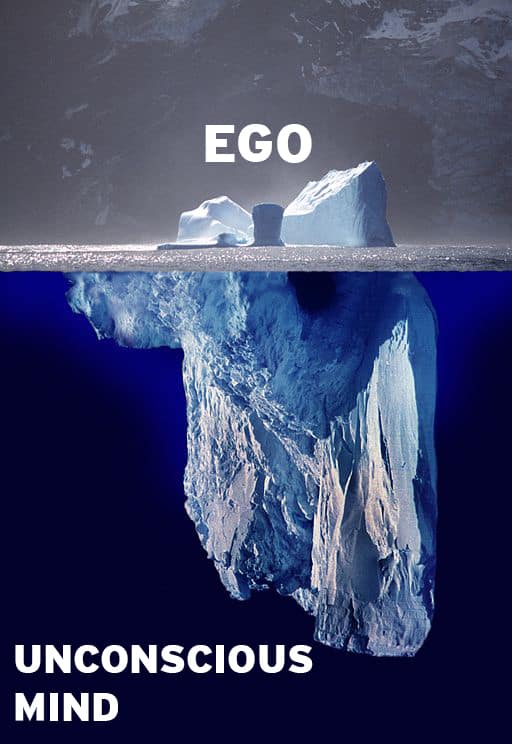
( แหล่งที่มา https://commons.wikimedia.org/wiki/File:Iceberg.jpg?ref=highexistence.com )
Much of that bulk consists of our repressed thoughts, memories, emotions, impulses, traits, and actions. Jung envisioned those rejected pieces coming together to form a large, unseen piece of our personality beneath our awareness, secretly controlling much of what we say, believe, and do.ส่วนใหญ่ประกอบด้วยความคิด ความทรงจำ อารมณ์ แรงกระตุ้น คุณลักษณะ และการกระทำที่อดกลั้นของเรา จุงจินตนาการถึงชิ้นส่วนที่ถูกปฏิเสธเหล่านั้นมารวมกันเพื่อสร้างบุคลิกภาพชิ้นใหญ่ที่มองไม่เห็นภายใต้การรับรู้ของเรา โดยแอบควบคุมสิ่งที่เราพูด เชื่อ และทำเป็นส่วนใหญ่
This secret piece of the personality is the shadow self. บุคลิกภาพที่เป็นความลับชิ้นนี้ก็คือตัวตนที่เป็นเงา
Origins of the Shadow Self ต้นกำเนิดของเงาตนเอง
Our society teaches us that certain behaviors, emotional patterns, sexual desires, lifestyle choices, etc. are inappropriate. These “inappropriate” qualities are usually those that disrupt the flow of a functioning society—even if that disruption means challenging people to accept things that make them uncomfortable. Anyone who is too challenging becomes outcast, and everyone else moves on. สังคมของเราสอนเราว่าพฤติกรรม รูปแบบอารมณ์ ความต้องการทางเพศ การเลือกวิถีชีวิต ฯลฯ บางอย่างนั้นไม่เหมาะสม คุณสมบัติที่ “ไม่เหมาะสม” เหล่านี้มักเป็นคุณสมบัติที่ขัดขวางการไหลเวียนของสังคมที่ใช้งานได้ แม้ว่าการหยุดชะงักนั้นจะหมายถึงการท้าทายผู้คนให้ยอมรับสิ่งที่ทำให้พวกเขาไม่สบายใจก็ตาม ใครก็ตามที่ท้าทายเกินไปจะถูกไล่ออก และคนอื่นๆ ก็ต้องเดินหน้าต่อไป
Now, we humans are highly social creatures, and the last thing we want is to be excommunicated from the rest of our tribe. So, in order to avoid being cast out, we do whatever it takes to fit in. Early in our childhood development, we find where the line between what is socially “acceptable” and “unacceptable” is, and we spend the rest of our lives trying to toe it. ตอนนี้ มนุษย์เราเป็นสัตว์สังคมสูง และสิ่งสุดท้ายที่เราต้องการก็คือถูกปัพพาชนียกรรมจากเผ่าอื่นๆ ของเรา ดังนั้น เพื่อหลีกเลี่ยงการถูกไล่ออก เราทำทุกอย่างเพื่อให้เข้ากับตัวเองได้ ในช่วงต้นของการพัฒนาวัยเด็กของเรา เราพบว่าเส้นแบ่งระหว่างสิ่งที่ "ยอมรับได้" ในสังคมและ "ไม่เป็นที่ยอมรับ" และเราใช้เวลาที่เหลือของเรา ชีวิตที่พยายามจะก้าวไปสู่มัน
When we cross that line, as we all frequently do, we suffer the pain of society’s backlash. People judge us, condemn us, gossip about us, and the unpleasant emotions that come with this experience can quickly become overwhelming. However, we don’t actually need people to observe our deviances to suffer for them. Eventually, we internalize society’s backlash so deeply that we inflict it on ourselves. เมื่อเราข้ามเส้นนั้นเหมือนที่เราทุกคนทำบ่อยๆ เราต้องทนทุกข์ทรมานจากการตอบโต้ของสังคม ผู้คนตัดสินเรา ประณามเรา นินทาเรา และอารมณ์อันไม่พึงประสงค์ที่มาพร้อมกับประสบการณ์นี้อาจล้นหลามอย่างรวดเร็ว อย่างไรก็ตาม จริงๆ แล้วเราไม่ต้องการให้คนอื่นสังเกตความเบี่ยงเบนของเราเพื่อทนทุกข์เพื่อพวกเขา ในที่สุด เราก็เก็บเอาการตอบโต้ของสังคมไว้อย่างลึกซึ้งจนเราสร้างความเสียหายให้กับตัวเราเอง
The only way to escape from this perpetual recurring pain is to mask it. Enter the ego. We tell ourselves stories about who we are, who we are not, and what we would never do to protect ourselves from suffering the consequences of being an outcast. Ultimately, we believe these stories, and once we develop a firm belief about something, we unconsciously discard any information that contradicts that belief. In the world of psychology, this is known as confirmation bias: humans tend to interpret and ignore information in ways that confirm what they already believe. วิธีเดียวที่จะหลีกหนีจากความเจ็บปวดที่เกิดขึ้นอย่างต่อเนื่องนี้คือการปกปิดมัน ป้อนอัตตา เราเล่าเรื่องราวเกี่ยวกับสิ่งที่เราเป็น เราไม่ใช่ใคร และสิ่งที่เราจะไม่ทำเพื่อปกป้องตนเองจากการทนทุกข์จากผลที่ตามมาจากการเป็นคนนอกรีต ท้ายที่สุดแล้ว เราเชื่อเรื่องราวเหล่านี้ และเมื่อเราพัฒนาความเชื่อที่มั่นคงเกี่ยวกับบางสิ่งบางอย่างเราจะละทิ้งข้อมูลใดๆ ที่ขัดแย้งกับความเชื่อนั้นโดยไม่รู้ตัว ในโลกของจิตวิทยา สิ่งนี้เรียกว่าอคติในการยืนยัน : มนุษย์มักจะตีความและเพิกเฉยต่อข้อมูลในลักษณะที่ยืนยันสิ่งที่พวกเขาเชื่ออยู่แล้ว
The problem is that literally everyone possesses qualities that society has deemed undesirable. People fall short of others’ expectations, have a temper flare-up, are excessively gassy, etc. The ideal individual in any society is one who lives up to impossible standards. ปัญหาก็คือว่าทุกคน อย่างแท้จริงมีคุณสมบัติที่สังคมเห็นว่าไม่เป็นที่พึงปรารถนา อย่างแท้จริง ผู้คนขาดความคาดหวังของผู้อื่น มีอารมณ์ฉุนเฉียว โมโหง่าย ฯลฯ บุคคลในอุดมคติในทุกสังคมคือผู้ที่ดำเนินชีวิตตามมาตรฐานที่เป็นไปไม่ได้
What no one wants to admit to others is that we are all secretly failing to meet those standards. Women wear makeup, men use Axe deodorant, advertisers Photoshop celebrities, people filter their personalities with photos and status updates on social media—all to mask perceived flaws and project an image of “perfection.” Jung called these social masks we all wear our “personas.”สิ่งที่ไม่มีใครอยากยอมรับกับผู้อื่นก็คือเราทุกคนแอบล้มเหลวในการปฏิบัติตามมาตรฐานเหล่านั้น ผู้หญิงแต่งหน้า ผู้ชายใช้ผลิตภัณฑ์ระงับกลิ่นกายของ Axe นักโฆษณาคนดังใน Photoshop ผู้คนกรองบุคลิกของตนเองด้วยรูปถ่ายและการอัพเดตสถานะบนโซเชียลมีเดีย ทั้งหมดนี้เพื่อปกปิดข้อบกพร่องที่รับรู้และสร้างภาพลักษณ์ของ "ความสมบูรณ์แบบ" จุงเรียกหน้ากากโซเชียลเหล่านี้ว่าเราทุกคนสวม " บุคลิก " ของเรา
“Unfortunately there can be no doubt that man is, on the whole, less good than he imagines himself or wants to be. Everyone carries a shadow, and the less it is embodied in the individual’s conscious life, the blacker and denser it is. If an inferiority is conscious, one always has a chance to correct it. Furthermore, it is constantly in contact with other interests, so that it is continually subjected to modifications. But if it is repressed and isolated from consciousness, it never gets corrected.”
— Carl Jung, Psychology and Religion (1938)
“น่าเสียดาย ไม่ต้องสงสัยเลยว่าโดยรวมแล้วมนุษย์ดีน้อยกว่าที่เขาจินตนาการหรืออยากเป็น ทุกคนต่างแบกเงาไว้ และยิ่งเงานั้นเข้าไปอยู่ในชีวิตที่มีสติของแต่ละบุคคลน้อยเท่าใด เงาก็จะยิ่งมืดมนและหนาแน่นมากขึ้นเท่านั้น หากมีสติมีปมด้อยอยู่ก็มีโอกาสแก้ไขได้เสมอ นอกจากนี้ยังติดต่อกับผลประโยชน์อื่น ๆ อยู่ตลอดเวลา ดังนั้นจึงต้องมีการแก้ไขอย่างต่อเนื่อง แต่ถ้ามันถูกอดกลั้นและแยกออกจากจิตสำนึก มันก็ไม่มีวันได้รับการแก้ไข”
— คาร์ล ยุงจิตวิทยาและศาสนา (1938)
Uncommon thoughts and emotions put us at an even higher risk of being alienated from society. Ideas that are challenging or contrary to social norms are considered dangerous and are best left unexpressed if one wishes to “fit in.” ความคิดและอารมณ์ที่ไม่ธรรมดาทำให้เรามีความเสี่ยงสูงที่จะถูกเหินห่างจากสังคม แนวคิดที่ท้าทายหรือขัดต่อบรรทัดฐานทางสังคมถือเป็นอันตราย และไม่ควรแสดงออกหากใครต้องการ "เข้าได้"
Emotionally, any mood other than happy, or at least neutral, is considered undesirable. Rather than admit we are going through a difficult experience, thus making others uncomfortable with the knowledge that we are uncomfortable, we say that we’re fine when we’re really not. ในทางอารมณ์ อารมณ์อื่นๆ นอกเหนือจากความสุขหรืออย่างน้อยก็เป็นกลางถือเป็นสิ่งที่ไม่พึงประสงค์ แทนที่จะยอมรับว่าเรากำลังเผชิญกับประสบการณ์ที่ยากลำบาก จึงทำให้คนอื่นไม่สบายใจกับความรู้ที่ว่าเราไม่สบายใจ เรากลับบอกว่าเราสบายดีทั้งๆ ที่เราไม่สบายใจจริงๆ
Ironically, this need to avoid things that make us and others uncomfortable undermines our ability to confront and either heal or integrate them. And if this failure to heal is bad for us as individuals, the effects of that failure on a mass scale are catastrophic.น่าแปลกที่ความจำเป็นต้องหลีกเลี่ยงสิ่งที่ทำให้เราและคนอื่นๆ ไม่สบายใจจะบ่อนทำลายความสามารถของเราในการเผชิญหน้าและรักษาหรือบูรณาการสิ่งเหล่านั้นและหากความล้มเหลวในการรักษานี้ส่งผลเสียต่อเราในฐานะปัจเจกบุคคล ผลกระทบของความล้มเหลวนั้นในวงกว้างก็ถือเป็นหายนะ
When our cultures were in their infancies, past humans beheld their more animalistic tendencies (murder, rape, war, etc.) with revulsion and fear. They developed a moral code, most often based on religious beliefs, about how the ideal, or “enlightened,” human should behave.เมื่อวัฒนธรรมของเรายังอยู่ในช่วงเริ่มต้น มนุษย์ในอดีตมองเห็นแนวโน้มที่เป็นสัตว์มากขึ้น (การฆาตกรรม การข่มขืน สงคราม ฯลฯ) ด้วยความรังเกียจและหวาดกลัว พวกเขาพัฒนาหลักศีลธรรม ซึ่งส่วนใหญ่มักอิงจากความเชื่อทางศาสนา ว่ามนุษย์ในอุดมคติหรือ "ผู้รู้แจ้ง" ควรประพฤติตนอย่างไร
While these ideals were intended to be inspiring, giving humans a model for spiritual growth, they were challenging in their tendencies to go against fundamental aspects of human nature. In many ways this is a good thing, since a society that allows rape, murder, and rampant violence does not tend to be a very good one to live in. แม้ว่าอุดมคติเหล่านี้มีจุดมุ่งหมายเพื่อเป็นแรงบันดาลใจ ทำให้มนุษย์เป็นแบบอย่างสำหรับการเติบโตทางจิตวิญญาณ แต่อุดมคติเหล่านี้กลับท้าทายแนวโน้มที่จะขัดแย้งกับแง่มุมพื้นฐานของธรรมชาติของมนุษย์ นี่เป็นสิ่งที่ดีในหลาย ๆ ด้าน เนื่องจากสังคมที่ยอมให้มีการข่มขืน การฆาตกรรม และความรุนแรงที่แพร่ขยายออกไป มักจะไม่ใช่สังคมที่ดีนัก
However, our collective moral codes fall short because they only offer ideals. Religious and secular morals only tell us who to be, not how to become that person. When solutions are offered, they are bogged down in esoteric practice that the average person has a hard time understanding—at least not without years of mentoring and study, something that not all of us have the luxury to undergo. We can’t all be monks, after all.
อย่างไรก็ตาม หลักจริยธรรมโดยรวมของเราขาดไปเนื่องจากเป็นเพียงอุดมคติเท่านั้น ศีลธรรมทางศาสนาและทางโลกเพียงแต่บอกเราว่าจะต้องเป็นใคร ไม่ใช่ทำอย่างไรจึงจะกลายเป็นบุคคลนั้นได้ เมื่อมีการเสนอวิธีแก้ปัญหา พวกเขาจมอยู่กับการปฏิบัติลึกลับที่คนทั่วไปมีช่วงเวลาที่ยากลำบากในการทำความเข้าใจ—อย่างน้อยก็ไม่ต้องผ่านการให้คำปรึกษาและการศึกษาเป็นเวลาหลายปี ซึ่งเป็นสิ่งที่ไม่ใช่เราทุกคนจะมีความหรูหราที่จะเผชิญได้ เราทุกคนไม่สามารถเป็นพระภิกษุได้
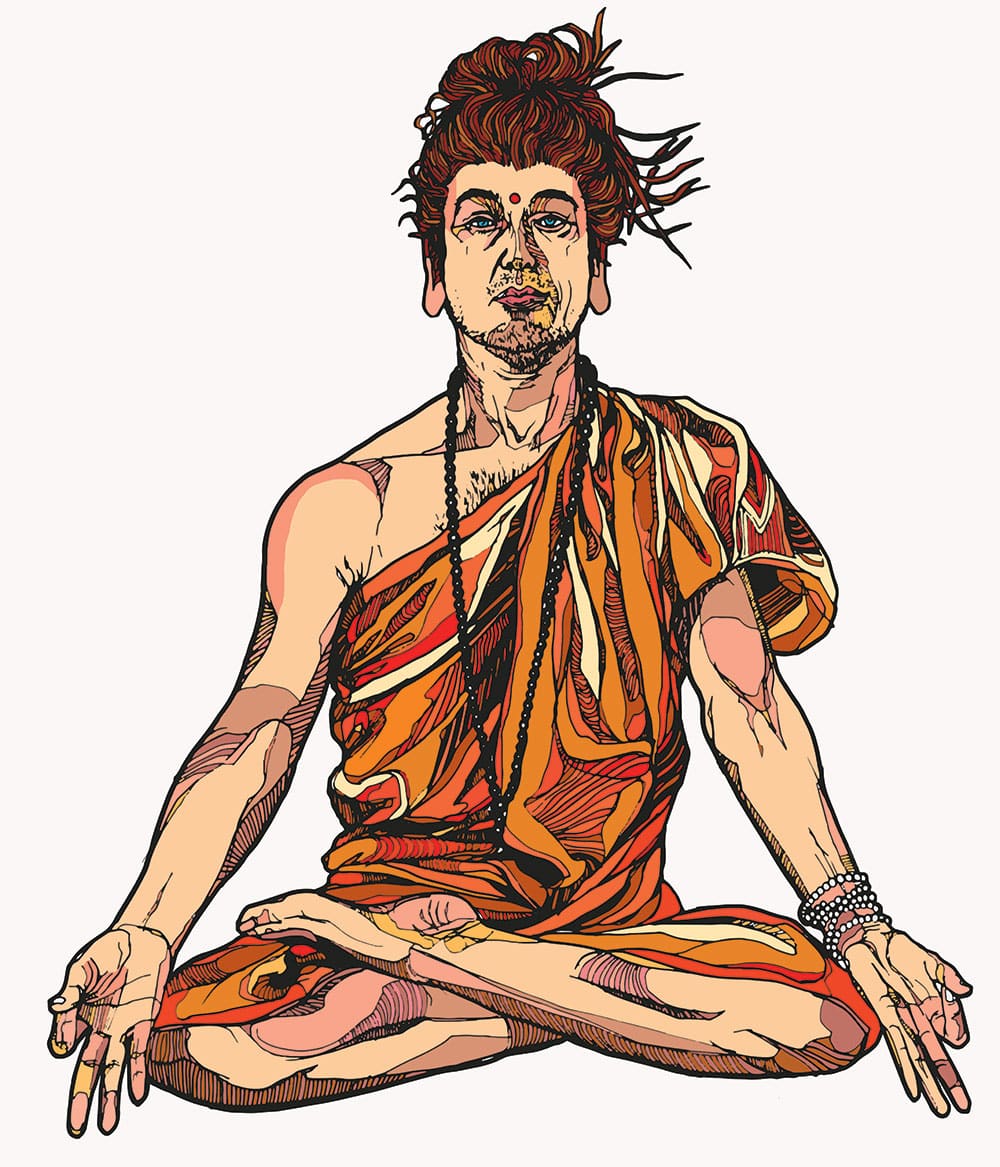
We can’t all be this guy. เราทุกคนไม่สามารถเป็นผู้ชายคนนี้ได้
The result is that we struggle to change in ways that require us to suppress our base animal instincts without giving them safe outlets through which to manifest. In other words, we push our failures into the unconscious, where we can ignore them and go on pretending to be the people society wants us to be. We get to pretend to be enlightened without actually doing the deep inner work that it takes to move through the developmental process.ผลลัพธ์ก็คือเราดิ้นรนที่จะเปลี่ยนแปลงวิธีที่เราต้องระงับสัญชาตญาณพื้นฐานของสัตว์โดยไม่ให้ทางออกที่ปลอดภัยแก่พวกมันในการแสดงออก กล่าวอีกนัยหนึ่ง เราผลักดันความล้มเหลวของเราไปสู่จิตไร้สำนึก โดยที่เราสามารถเพิกเฉยต่อสิ่งเหล่านั้น และแสร้งทำเป็นเป็นคนที่สังคมต้องการให้เราเป็น เราต้องแสร้งทำเป็นว่าเป็นผู้รู้แจ้งโดยไม่ต้องทำงานลึกๆ ที่จำเป็นเพื่อก้าวผ่านกระบวนการพัฒนา
Enlightenment: The Shadow Formula
“Until you make the unconscious conscious, it will direct your life and you will call it fate.”
— Carl Jung
การตรัสรู้: สูตรเงา
“จนกว่าคุณจะทำให้หมดสติ มันจะกำหนดชีวิตของคุณ และคุณจะเรียกมันว่าโชคชะตา”
— คาร์ลจุง
Jung’s proposed solution to this schism is for the individual to undergo “shadow work.” What we repress never stays repressed, it lives on in the unconscious—and, despite what our egos would have us believe, the unconscious mind is the one really running the show.
“Filling the conscious mind with ideal conceptions is a characteristic of Western theosophy, but not the confrontation with the shadow self and the world of darkness. One does not become enlightened by imagining figures of light, but by making the darkness conscious.”
— Carl Jung, “The Philosophical Tree,” Alchemical Studies (1945)
วิธีแก้ปัญหาที่จุงเสนอต่อความแตกแยกนี้คือให้บุคคลนั้นได้รับ "งานเงา" สิ่งที่เราอดกลั้นไม่เคยถูกอดกลั้น มันยังคงอยู่ในจิตไร้สำนึก และถึงแม้อัตตาของเราจะทำให้เราเชื่ออย่างไร จิตใต้สำนึกก็ยังเป็นผู้ดำเนินการอย่างแท้จริง
“การเติมเต็มจิตสำนึกด้วยมโนทัศน์ในอุดมคติเป็นลักษณะเฉพาะของทฤษฎีตะวันตก แต่ไม่ใช่การเผชิญหน้ากับตัวตนที่เป็นเงาและโลกแห่งความมืด เราไม่ได้รู้แจ้งโดยการจินตนาการถึงแสงสว่าง แต่โดยการทำให้ความมืดมีสติ”
— คาร์ล จุง “ต้นไม้ปรัชญา” ศึกษาการเล่นแร่แปรธาตุ (1945)
Shadow work, then, is the process of making the unconscious conscious. In doing so, we gain awareness of our unconscious impulses and can then choose whether and how to act on them. We begin this process when we take a step back from our normal patterns of behavior and observe what is happening within us. Meditation is a great way to develop this ability to step back from ourselves, with the goal being to gain the ability to do this as we go about our daily lives. งานเงาจึงเป็นกระบวนการทำให้จิตไร้สำนึก ในการทำเช่นนั้น เราจะตระหนักถึงแรงกระตุ้นในจิตใต้สำนึกของเรา และสามารถเลือกได้ว่าจะดำเนินการกับสิ่งเหล่านั้นหรือไม่และอย่างไร เราเริ่มต้นกระบวนการนี้เมื่อเราถอยห่างจากรูปแบบพฤติกรรมปกติของเราและสังเกตสิ่งที่เกิดขึ้นภายในตัวเราการทำสมาธิเป็นวิธีที่ดีเยี่ยมในการพัฒนาความสามารถในการถอยห่างจากตัวเราเอง โดยมีเป้าหมายคือการได้รับความสามารถในการทำเช่นนี้ในระหว่างที่เราดำเนินชีวิตประจำวัน
The next step is to question. When we observe ourselves reacting to psychological triggers, or events that prompt an instant and uncontrolled reaction from us, we must learn to pause and ask ourselves, “Why am I reacting this way?” This teaches us to backtrack through our emotions to our memories, which hold the origins of our emotional programming.ขั้นตอนต่อไปคือการตั้งคำถาม เมื่อเราสังเกตตัวเองมีปฏิกิริยาต่อสิ่งกระตุ้นทางจิต หรือเหตุการณ์ที่กระตุ้นให้เกิดปฏิกิริยาโต้ตอบทันทีและควบคุมไม่ได้จากเรา เราต้องเรียนรู้ที่จะหยุดและถามตัวเองว่า “ทำไมฉันถึงมีปฏิกิริยาเช่นนี้” สิ่งนี้สอนให้เราย้อนอดีตผ่านอารมณ์ไปสู่ความทรงจำซึ่งเป็นต้นกำเนิดของโปรแกรมทางอารมณ์ของเรา
Identifying triggers can be a difficult process due to our natural desire to avoid acknowledging the shadow self. Our tendency is to justify our actions after the fact, when really the best thing we can do is avoid acting reactively or unconsciously in the first place. Cultivating an awareness of the shadow is the first step to identifying our triggers—but before we can do that, we must first overcome our instinctive fear of our shadows.การระบุตัวกระตุ้นอาจเป็นกระบวนการที่ยาก เนื่องจากความปรารถนาตามธรรมชาติของเราที่จะหลีกเลี่ยงการรับรู้ถึงเงาของตัวเอง แนวโน้มของเราคือการพิสูจน์การกระทำของเราหลังจากความเป็นจริง ในเมื่อสิ่งที่ดีที่สุดที่เราสามารถทำได้คือหลีกเลี่ยงการแสดงปฏิกิริยาหรือโดยไม่รู้ตัวตั้งแต่แรก การปลูกฝังการรับรู้ถึงเงาเป็นขั้นตอนแรกในการระบุสิ่งกระตุ้นของเรา แต่ก่อนที่เราจะทำเช่นนั้นได้ เราต้องเอาชนะความกลัวตามสัญชาตญาณต่อเงาของเราเสียก่อน
Perhaps the biggest issue people face when confronted with the shadow is the question, “Am I a bad person?” Acknowledging the shadow means acknowledging that we contain darkness, a capacity for malevolence. As Jung wrote in Psychology of the Unconscious:
“It is a frightening thought that man also has a shadow side to him, consisting not just of little weaknesses and foibles, but of a positively demonic dynamism. The individual seldom knows anything of this; to him, as an individual, it is incredible that he should ever in any circumstances go beyond himself. But let these harmless creatures form a mass, and there emerges a raging monster; and each individual is only one tiny cell in the monster’s body, so that for better or worse he must accompany it on its bloody rampages and even assist it to the utmost. Having a dark suspicion of these grim possibilities, man turns a blind eye to the shadow-side of human nature.”
บางทีปัญหาใหญ่ที่สุดที่ผู้คนเผชิญเมื่อเผชิญหน้ากับเงาก็คือคำถามที่ว่า“ฉันเป็นคนไม่ดีหรือเปล่า?”การยอมรับเงาหมายถึงการยอมรับว่าเรามีความมืดอยู่ ความสามารถในการก่อความมุ่งร้ายได้ ดังที่จุงเขียนไว้ในจิตวิทยาแห่งจิตใต้สำนึก :
“เป็นความคิดที่น่าสะพรึงกลัวที่มนุษย์ก็มีด้านเงาเช่นกัน ซึ่งประกอบด้วยไม่เพียงแต่จุดอ่อนและข้อบกพร่องเล็กๆ น้อยๆ เท่านั้น แต่ยังรวมถึงพลังทางบวกของปีศาจอีกด้วย แต่ละคนแทบไม่รู้เรื่องนี้เลย สำหรับเขาในฐานะปัจเจกบุคคล เป็นเรื่องเหลือเชื่อที่เขาควรจะก้าวไปไกลกว่าตัวเขาเองในทุกสถานการณ์แต่ปล่อยให้สิ่งมีชีวิตที่ไม่เป็นอันตรายเหล่านี้รวมตัวกันเป็นฝูงและมีสัตว์ประหลาดที่ดุเดือดปรากฏตัวออกมา และแต่ละคนก็เป็นเพียงเซลล์เล็กๆ เซลล์เดียวในร่างกายของสัตว์ประหลาด ดังนั้นไม่ว่าจะดีขึ้นหรือแย่ลงเขาจะต้องติดตามมันไปอาละวาดนองเลือดและช่วยเหลือมันอย่างเต็มที่ด้วยความสงสัยอันมืดมนถึงความเป็นไปได้อันเลวร้ายเหล่านี้ มนุษย์จึงเมินเฉยต่อด้านเงาของธรรมชาติของมนุษย์”
Jung indicates that under certain circumstances, all human beings have the capacity to do horrible, brutal things. And somewhat paradoxically, familiarizing ourselves with these dark potentialities and accepting them as part of us is perhaps the best way to ensure that they are never actualized. But again, it’s profoundly difficult to do this, particularly because we desperately don’t want to think of ourselves as “bad” people.จุงชี้ให้เห็นว่าภายใต้สถานการณ์บางอย่าง มนุษย์ทุกคนมีความสามารถในการทำสิ่งเลวร้ายและโหดร้ายได้ และค่อนข้างขัดแย้งกันการทำความคุ้นเคยกับศักยภาพด้านมืดเหล่านี้และการยอมรับพวกเขาเป็นส่วนหนึ่งของเราอาจเป็นวิธีที่ดีที่สุดเพื่อให้แน่ใจว่าสิ่งเหล่านั้นจะไม่มีวันเกิดขึ้นจริง แต่ขอย้ำอีกครั้งว่าการทำเช่นนี้เป็นเรื่องยากอย่างยิ่ง โดยเฉพาะอย่างยิ่งเพราะเราไม่อยากจะคิดว่าตัวเองเป็นคน "ไม่ดี" เลย
So, do taboo thoughts, hurtful actions, and the capacity to commit atrocities make you a bad person? No, not necessarily. Of course, everyone has a different definition of how “good” and “bad” people act—and those moral definitions are to some extent irreducibly subjective and arbitrary—but when it comes to the general consensus of “goodness,” you can make mistakes and hurt others without having an awareness of what you’re doing and still be a good person. Beyond that, once you acknowledge the massive potential for both light and darkness within each human being, the dichotomy of “good” people vs “bad” people begins to seem reductive and misleading. Above all, you’re human, and as such, too complex to be neatly categorized.ดังนั้น ความคิดต้องห้าม การกระทำที่เป็นอันตราย และความสามารถในการกระทำการโหดร้ายทำให้คุณเป็นคนไม่ดีหรือไม่? ไม่ไม่จำเป็น แน่นอนว่า ทุกคนมีคำจำกัดความที่แตกต่างกันว่าคน "ดี" และ "คนเลว" ประพฤติตัวอย่างไร และคำจำกัดความทางศีลธรรมเหล่านั้นก็ขึ้นอยู่กับดุลยพินิจและตามอำเภอใจไม่ลดหย่อนแต่เมื่อพูดถึงฉันทามติทั่วไปเกี่ยวกับ "ความดี" คุณก็อาจทำผิดพลาดได้ และทำร้ายผู้อื่นโดยไม่รู้ตัวว่ากำลังทำอะไรอยู่และยังเป็นคนดีอยู่ ยิ่งไปกว่านั้น เมื่อคุณรับทราบถึงศักยภาพมหาศาลของทั้งแสงสว่างและความมืดภายในมนุษย์แต่ละคน การแบ่งแยกระหว่างคน "ดี" กับ "คนเลว" จะเริ่มดูเหมือนลดน้อยลงและทำให้เข้าใจผิด เหนือสิ่งอื่นใด คุณเป็นมนุษย์และด้วยเหตุนี้ ซับซ้อนเกินกว่าจะจัดหมวดหมู่ให้เรียบร้อย
Nonetheless, the idea of being a good person is not without merit, and most of us intuitively understand that it’s a fine idea to move in the direction of greater self-awareness, self-mastery, and compassion. Doing difficult shadow work—recognizing and correcting our unconscious destructive patterns—is a crucial aspect of becoming a better person.อย่างไรก็ตาม ความคิดในการเป็นคนดีไม่ได้ปราศจากคุณธรรม และพวกเราส่วนใหญ่เข้าใจโดยสัญชาตญาณว่า เป็นความคิดที่ดีที่จะก้าวไปในทิศทางของการตระหนักรู้ในตนเอง การควบคุมตนเอง และความเห็นอกเห็นใจมากขึ้น การทำงานเงาที่ยากลำบาก—การรับรู้และแก้ไขรูปแบบการทำลายล้างในจิตใต้สำนึกของเรา—เป็นสิ่งสำคัญอย่างยิ่งในการเป็นคนที่ดีขึ้น
Once we identify the original sources of our psychological triggers (e.g. repressed fear, pain, aggression, etc.), only then can we begin to heal and integrate those wounded parts of ourselves. Integration, in Jung’s definition, means that we cease rejecting parts of our personalities and find ways to bring them forward into our everyday lives. We accept our shadows and seek to unlock the wisdom they contain. Fear becomes an opportunity for courage. Pain is a catalyst for strength and resilience. Aggression is transmuted into warrior-like passion. This wisdom informs our actions, our decisions, and our interactions with others. We understand how others feel and respond to them with compassion, knowing that they are being triggered themselves.เมื่อเราระบุแหล่งที่มาดั้งเดิมของสิ่งกระตุ้นทางจิตของเรา (เช่น ความกลัวที่อดกลั้น ความเจ็บปวด ความก้าวร้าว ฯลฯ) จากนั้นเราก็จะสามารถเริ่มรักษาและบูรณาการส่วนที่บาดเจ็บในตัวเรา การบูรณาการตามคำจำกัดความของ Jung หมายความว่าเราเลิกปฏิเสธบุคลิกภาพบางส่วนของเรา และค้นหาวิธีที่จะนำสิ่งเหล่านี้เข้ามาในชีวิตประจำวันของเรา เรายอมรับเงาของเราและพยายามปลดล็อกภูมิปัญญาที่มีอยู่ ความกลัวกลายเป็นโอกาสสำหรับความกล้าหาญ ความเจ็บปวดเป็นตัวเร่งให้เกิดความแข็งแกร่งและความยืดหยุ่น ความก้าวร้าวถูกแปลงเป็นความหลงใหลเหมือนนักรบ ภูมิปัญญานี้แจ้งการกระทำ การตัดสินใจ และการโต้ตอบของเรากับผู้อื่น เราเข้าใจความรู้สึกของผู้อื่นและตอบสนองต่อพวกเขาด้วยความเห็นอกเห็นใจ โดยรู้ว่าพวกเขากำลังถูกกระตุ้นตัวเอง
One aspect of integrating the shadow self is healing our psychological wounds from early childhood and beyond. As we embark on this work, we begin to understand that much of our shadow is the result of being hurt and trying to protect ourselves from re-experiencing that hurt. We can accept what happened to us, acknowledge that we did not deserve the hurt and that these things were not our fault, and reclaim those lost pieces to move back into wholeness. (For especially deep traumas, it is advised to work with a trained psychologist on these issues.) This is a very intensive and involved process and merits another separate article to cover, but those who wish to know more can find a myriad of information on the subject in books, videos, articles, and self-improvement groups.ด้านหนึ่งของการบูรณาการตัวตนในเงาคือการรักษาบาดแผลทางจิตใจของเราตั้งแต่วัยเด็กและต่อจากนี้ เมื่อเราเริ่มงานนี้ เราเริ่มเข้าใจว่าเงาส่วนใหญ่ของเราเป็นผลมาจากการถูกทำร้าย และพยายามปกป้องตนเองจากการประสบกับความเจ็บปวดนั้นอีกครั้ง เราสามารถยอมรับสิ่งที่เกิดขึ้นกับเรา ยอมรับว่าเราไม่สมควรได้รับความเจ็บปวด และสิ่งเหล่านี้ไม่ใช่ความผิดของเรา และเรียกคืนชิ้นส่วนที่สูญหายเหล่านั้นเพื่อกลับคืนสู่สภาพที่สมบูรณ์ (สำหรับบาดแผลทางจิตใจที่ฝังลึกเป็นพิเศษ ขอแนะนำให้ทำงานร่วมกับนักจิตวิทยาที่ผ่านการฝึกอบรมในประเด็นเหล่านี้) กระบวนการนี้เป็นกระบวนการที่เข้มข้นและเกี่ยวข้องมากและสมควรได้รับบทความอื่นที่จะกล่าวถึง แต่ผู้ที่ต้องการทราบข้อมูลเพิ่มเติมสามารถค้นหาข้อมูลมากมายเกี่ยวกับ หัวข้อในหนังสือวีดิทัศน์บทความและกลุ่มพัฒนาตนเอง
Unfortunately, many philosophies insist that people can become enlightened without doing this deep inner work. The proposed solution within these philosophies seems to be to actively ignore unconscious impulses rather than to dig in and understand them.น่าเสียดายที่ปรัชญาหลายข้อยืนกรานว่าผู้คนสามารถรู้แจ้งได้โดยไม่ต้องทำงานภายในอันลึกซึ้งนี้ วิธีแก้ปัญหาที่นำเสนอในปรัชญาเหล่านี้ดูเหมือนจะเป็นการเพิกเฉยต่อแรงกระตุ้นในจิตใต้สำนึกอย่างแข็งขัน แทนที่จะเจาะลึกและทำความเข้าใจสิ่งเหล่านั้น
Not trying to point fingers, but many of these philosophies come from Newer (*cough, cough*, Age) ideas, which often misinterpret ancient teachings to fit into the modern desire for convenience and comfort. I’d love to rip these teachings a new one in another article, but for now, it is good to be wary of anyone who insists that you can reach enlightenment without working on those parts of yourself that are messy and painful. Ultimately, you’ll have to use your own discretion to decide what resonates most with you—but don’t be surprised to find yourself facing a crisis if you opt to take the path of avoidance.ไม่ได้พยายามที่จะชี้นิ้ว แต่ปรัชญาเหล่านี้จำนวนมากมาจากแนวคิดที่ใหม่กว่า (*ไอ ไอ* อายุ) ซึ่งมักจะตีความคำสอนโบราณอย่างผิดๆ เพื่อให้เข้ากับความปรารถนาสมัยใหม่ในเรื่องความสะดวกสบายและความสะดวกสบาย ฉันอยากจะฉีกคำสอนเหล่านี้ไปไว้ในบทความอื่น แต่สำหรับตอนนี้ เป็นการดีที่จะระวังใครก็ตามที่ยืนกรานว่าคุณสามารถเข้าถึงการรู้แจ้งได้โดยไม่ต้องทำงานในส่วนที่ยุ่งเหยิงและเจ็บปวดในตัวคุณ ท้ายที่สุด คุณจะต้องใช้วิจารณญาณของตนเองในการตัดสินใจว่าสิ่งใดโดนใจคุณมากที่สุด แต่อย่าแปลกใจที่พบว่าตัวเองกำลังเผชิญกับวิกฤติหากคุณเลือกที่จะใช้เส้นทางแห่งการหลีกเลี่ยง
As Jung points out, we can’t correct undesirable behaviors until we deal with them head on. The shadow self acts out like a disobedient child until all aspects of the personality are acknowledged and integrated. Whereas many spiritual philosophies often denounce the shadow as something to be overcome and transcended, Jung insists that the true aim is not to defeat the shadow self, but to incorporate it with the rest of the personality. It is only through this merging that true wholeness can be attained, and when it is, that is enlightenment.ดังที่จุงชี้ให้เห็น เราไม่สามารถแก้ไขพฤติกรรมที่ไม่พึงประสงค์ได้จนกว่าเราจะจัดการกับพวกมันโดยตรง ตัวตนเงาทำตัวเหมือนเด็กที่ไม่เชื่อฟังจนกว่าบุคลิกภาพทุกด้านจะได้รับการยอมรับและบูรณาการ ในขณะที่ปรัชญาทางจิตวิญญาณจำนวนมากมักประณามเงาว่าเป็นสิ่งที่ต้องเอาชนะและก้าวข้าม จุงยืนยันว่าเป้าหมายที่แท้จริงไม่ใช่การเอาชนะเงาตนเอง แต่เพื่อรวมเข้ากับบุคลิกภาพที่เหลือผ่านการผสานนี้เท่านั้นจึงจะบรรลุความสมบูรณ์ที่แท้จริงได้ และเมื่อเป็นเช่นนั้นแล้วนั่นคือการตรัสรู้
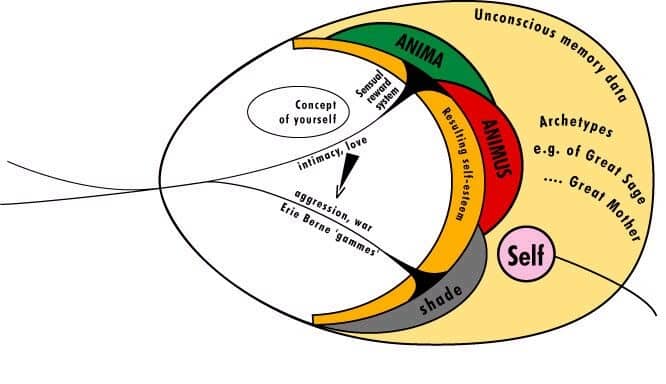
แบบจำลองจิตใจของจุนเกียน ในที่นี้ตัวตนของเงาเรียกว่า "เงา" คลิกที่ภาพเพื่อดูข้อมูลเพิ่มเติม ( แหล่งที่มา )
If You Want to Save the World, Tend to Your Shadow Self
“If you imagine someone who is brave enough to withdraw all his projections, then you get an individual who is conscious of a pretty thick shadow. Such a man has saddled himself with new problems and conflicts. He has become a serious problem to himself, as he is now unable to say that they do this or that, they are wrong, and they must be fought against… Such a man knows that whatever is wrong in the world is in himself, and if he only learns to deal with his own shadow he has done something real for the world. He has succeeded in shouldering at least an infinitesimal part of the gigantic, unsolved social problems of our day.”
— Carl Jung, Psychology and Religion (1938)
หากคุณต้องการกอบกู้โลก จงดูแลเงาของตัวเอง
“ถ้าคุณจินตนาการถึงใครสักคนที่กล้าหาญพอที่จะถอนภาพที่ฉายออกไปทั้งหมด คุณจะได้คนที่ตระหนักถึงเงาที่ค่อนข้างหนา คนเช่นนี้ต้องแบกรับปัญหาและความขัดแย้งใหม่ๆ เขากลายเป็นปัญหาร้ายแรงสำหรับตัวเอง เนื่องจากตอนนี้เขาไม่สามารถพูดได้ว่าทำสิ่งนี้หรือทำอย่างนั้น ผิด และต้องต่อสู้กับ… คนเช่นนั้นรู้ว่าสิ่งที่ผิดในโลกนั้นอยู่ที่ตัวเขาเอง หากเขาเพียงแต่เรียนรู้ที่จะจัดการกับเงาของตัวเอง เขาก็ได้ทำบางสิ่งที่แท้จริงเพื่อโลกนี้ เขาประสบความสำเร็จในการแบกรับปัญหาสังคมขนาดมหึมาและยังไม่ได้รับการแก้ไขในสมัยของเราอย่างน้อยก็ส่วนหนึ่ง”
— คาร์ล ยุงจิตวิทยาและศาสนา (1938)
While shadow work is a rewarding way to cultivate a deep and intimate understanding of ourselves, and thus evolve as individuals, the truth is that the world needs us to embark on this journey sooner rather than later. The collective shadow houses society’s basest impulses: those of greed, hatred, and violence. If one person acting on these impulses can do a lot of harm to others, what happens when we act on them as a collective? แม้ว่างานเงาเป็นวิธีที่คุ้มค่าในการปลูกฝังความเข้าใจที่ลึกซึ้งและใกล้ชิดเกี่ยวกับตัวเรา และพัฒนาไปเป็นรายบุคคล ความจริงก็คือโลกต้องการให้เราเริ่มต้นการเดินทางครั้งนี้ไม่ช้าก็เร็ว กลุ่มเงาที่รวบรวมแรงกระตุ้นพื้นฐานของสังคม: ความโลภ ความเกลียดชัง และความรุนแรง หากบุคคลหนึ่งปฏิบัติตามแรงกระตุ้นเหล่านี้สามารถทำร้ายผู้อื่นได้มากมาย จะเกิดอะไรขึ้นเมื่อเราปฏิบัติต่อสิ่งเหล่านั้นในฐานะส่วนรวม?
We can see the answer manifest in our world today. Unfettered greed leads to a stop-at-nothing drive to boost profits, which takes its toll on the Earth as we alter ecosystems and climate patterns to exhaust natural resources. Regional violence escalates in the areas affected by famine, drought, and climate disasters that irresponsible consumer practices, overpopulation, and industrialization create. The poor become poorer as corporate interests sway public opinion to form policies that benefit the rich at the expense of everyone else—especially those who are most disadvantaged.เราสามารถเห็นคำตอบปรากฏชัดในโลกของเราทุกวันนี้ ความโลภที่เป็นอิสระนำไปสู่การขับเคลื่อนอย่างไม่หยุดยั้งเพื่อเพิ่มผลกำไร ซึ่งส่งผลเสียหายต่อโลกในขณะที่เราเปลี่ยนแปลงระบบนิเวศและรูปแบบสภาพภูมิอากาศเพื่อทำให้ทรัพยากรธรรมชาติหมดไปความรุนแรงในภูมิภาคทวีความรุนแรงขึ้นในพื้นที่ที่ได้รับผลกระทบจากความอดอยาก ภัยแล้ง และภัยพิบัติด้านสภาพอากาศ ซึ่งก่อให้เกิดพฤติกรรมผู้บริโภคที่ไม่รับผิดชอบ การมีประชากรมากเกินไป และการพัฒนาทางอุตสาหกรรม คนจนจะจนลงเมื่อผลประโยชน์ขององค์กรมีอิทธิพลต่อความคิดเห็นของสาธารณชนเพื่อสร้างนโยบายที่เป็นประโยชน์ต่อคนรวยโดยที่คนอื่นๆ ต้องเสียค่าใช้จ่าย โดยเฉพาะอย่างยิ่งผู้ด้อยโอกาสที่สุด
We hate and fear what we don’t understand, prompting us to pursue violence against people rather than seek diplomatic solutions with one another. We project our own worst qualities onto our enemies to justify the violence against them. We hoard resources, ignore the suffering of others, and continue the patterns of behavior that pollute the world we all call home. เราเกลียดและกลัวสิ่งที่เราไม่เข้าใจ กระตุ้นให้เราดำเนินความรุนแรงต่อผู้คน แทนที่จะแสวงหาวิธีแก้ปัญหาทางการทูตระหว่างกัน เราแสดงคุณสมบัติที่เลวร้ายที่สุดของเราเองให้กับศัตรูของเราเพื่อพิสูจน์ความรุนแรงต่อพวกเขา เราสะสมทรัพยากร เพิกเฉยต่อความทุกข์ทรมานของผู้อื่น และสานต่อรูปแบบของพฤติกรรมที่ก่อให้เกิดมลพิษต่อโลกที่เราเรียกว่าบ้าน
These behaviors are not exclusive to the Western world, or to the Middle East, or South America, Africa, or any one region or people. We all do it, either by participating in the entities directly involved in the conflicts, or by allowing them to continue through our own inaction.พฤติกรรมเหล่านี้ไม่ได้เกิดขึ้นเฉพาะในโลกตะวันตก ตะวันออกกลาง อเมริกาใต้ แอฟริกา หรือภูมิภาคหรือผู้คนใดภูมิภาคหนึ่งเท่านั้น เราทุกคนทำเช่นนั้น ไม่ว่าจะโดยการมีส่วนร่วมในหน่วยงานที่เกี่ยวข้องโดยตรงกับความขัดแย้ง หรือโดยการปล่อยให้พวกเขาดำเนินต่อไปโดยที่เราเฉยเฉย
While these large-scale problems may seem impossible for any one person to influence, we each have more power in this game than we may think. For all our discussion of the abstract power of societies, they are still made up of individual people. When two people connect, they form a relationship. A group of relationships forms a community, and the place where communities intersect is what we come to know as society. แม้ว่าปัญหาใหญ่เหล่านี้อาจดูเหมือนเป็นไปไม่ได้ที่คนๆ เดียวจะมีอิทธิพล แต่เราแต่ละคนก็มีพลังในเกมนี้มากกว่าที่เราคิด สำหรับการอภิปรายทั้งหมดของเราเกี่ยวกับพลังนามธรรมของสังคม พวกเขายังคงประกอบด้วยบุคคล เมื่อคนสองคนเชื่อมต่อกัน พวกเขาจึงสร้างความสัมพันธ์ กลุ่มความสัมพันธ์ก่อตัวเป็นชุมชน และสถานที่ที่ชุมชนมาบรรจบกันคือสิ่งที่เรารู้จักในฐานะสังคม
Each of us is responsible for forming the social codes of our communities. Racism, for example, is a huge issue in the United States in the present moment and Americans are struggling to find a way to correct this prejudice and the inequality it creates. Whereas previously racism was a way to structure American society, modern Americans have decided this racial hierarchy is no longer appropriate. So, now, when people call out and denounce racism in their communities, they establish that racism is not an acceptable part of the social code. On the other hand, people who practice racism establish that it is appropriate, and people who ignore racism enable it. เราแต่ละคนมีหน้าที่รับผิดชอบในการสร้างรหัสทางสังคมของชุมชนของเรา ตัวอย่างเช่น การเหยียดเชื้อชาติเป็นปัญหาใหญ่ในสหรัฐอเมริกาในปัจจุบัน และชาวอเมริกันกำลังดิ้นรนเพื่อหาทางแก้ไขอคติและความไม่เท่าเทียมกันที่เกิดขึ้น ในขณะที่ก่อนหน้านี้การเหยียดเชื้อชาติเป็นวิธีการจัดโครงสร้างสังคมอเมริกัน แต่คนอเมริกันยุคใหม่ตัดสินใจว่าลำดับชั้นทางเชื้อชาตินี้ไม่เหมาะสมอีกต่อไป ดังนั้น ในเวลานี้ เมื่อผู้คนออกมาเรียกร้องและประณามการเหยียดเชื้อชาติในชุมชนของพวกเขา พวกเขาก็พิสูจน์ได้ว่าการเหยียดเชื้อชาตินั้นไม่เป็นส่วนหนึ่งของหลักปฏิบัติทางสังคมที่ยอมรับได้ ในทางกลับกัน คนที่เหยียดเชื้อชาติยืนยันว่ามันเหมาะสม และคนที่เพิกเฉยต่อเชื้อชาติก็ยอมรับ
Every day, you are building the culture of your community. When you smile at strangers, you promote a culture of kindness and connection. If you avoid making eye contact or speak to others coldly, you build a community based on distrust and animosity. ทุกๆ วัน คุณกำลังสร้างวัฒนธรรมของชุมชนของคุณ เมื่อคุณยิ้มให้คนแปลกหน้า คุณได้ส่งเสริมวัฒนธรรมแห่งความเมตตาและความเชื่อมโยง หากคุณหลีกเลี่ยงการสบตาหรือพูดคุยกับผู้อื่นอย่างเย็นชา คุณจะสร้างชุมชนบนพื้นฐานของความไม่ไว้วางใจและความเกลียดชัง
Our actions extend far beyond ourselves—they have a ripple effect on society as a whole. Consider cities like New York that have a reputation for being “rude.” Can a city really be rude? No, of course not—but all the individual people living there can. การกระทำของเราขยายไปไกลกว่าตัวเราเอง—สิ่งเหล่านี้ส่งผลกระทบกระเพื่อมต่อสังคมโดยรวม ลองพิจารณาเมืองต่างๆ เช่น นิวยอร์ก ที่มีชื่อเสียงว่า "หยาบคาย" เมืองจะหยาบคายได้จริงหรือ? ไม่ ไม่แน่นอน—แต่ทุกคนที่อาศัยอยู่ที่นั่นสามารถทำได้
Unfriendly communities are not hostile because of just one or two people, but because the majority of people act that way. When you have a large group of people living in close proximity all projecting and acting out their unconscious impulses on one another, the result is a toxic culture. People who hurt each other stop trusting one another, and without trust, communities fall apart and individuals become isolated. ชุมชนที่ไม่เป็นมิตรไม่ใช่ศัตรูกันเพราะมีเพียงหนึ่งหรือสองคน แต่เป็นเพราะคนส่วนใหญ่ประพฤติเช่นนั้น เมื่อคุณมีคนกลุ่มใหญ่ที่อาศัยอยู่ใกล้กันและแสดงแรงกระตุ้นโดยไม่รู้ตัวต่อกัน ผลที่ตามมาก็คือวัฒนธรรมที่เป็นพิษ คนที่ทำร้ายกันจะหยุดไว้วางใจซึ่งกันและกัน และหากไม่มีความไว้วางใจ ชุมชนจะแตกสลายและปัจเจกบุคคลจะถูกโดดเดี่ยว
However, this wave can be countered with a conscious effort to breed trust, connection, and kindness. อย่างไรก็ตาม คลื่นนี้สามารถตอบโต้ได้ด้วยความพยายามอย่างมีสติเพื่อสร้างความไว้วางใจ ความสัมพันธ์ และความเมตตา
These connections rebuild fragmented communities, helping us to overcome our isolation and tap into a collective or community mentality. When this happens we stop thinking selfishly and start thinking empathetically and cooperatively. As loving, healthy communities connect with one another, they work together to create public policies that benefit more people, extend help to those who need it, and work to preserve the natural world they inhabit.การเชื่อมต่อเหล่านี้สร้างชุมชนที่กระจัดกระจายขึ้นมาใหม่ ช่วยให้เราเอาชนะความโดดเดี่ยวและเข้าถึงความคิดโดยรวมหรือชุมชน เมื่อสิ่งนี้เกิดขึ้น เราก็หยุดคิดอย่างเห็นแก่ตัว และเริ่มคิดอย่างเห็นอกเห็นใจและให้ความร่วมมือ เนื่องจากชุมชนที่รักและมีสุขภาพดีเชื่อมโยงถึงกัน พวกเขาจึงทำงานร่วมกันเพื่อสร้างนโยบายสาธารณะที่เป็นประโยชน์ต่อผู้คนมากขึ้น ขยายความช่วยเหลือไปยังผู้ที่ต้องการ และทำงานเพื่อรักษาโลกธรรมชาติที่พวกเขาอาศัยอยู่
And this all begins with you. และทั้งหมดนี้เริ่มต้นกับคุณ
When you work to heal and integrate your shadow, you find that you stop living so reactively and unconsciously, thereby hurting others less. You build trust in your relationships, and the people whose lives you touch open themselves to others, building even more healthy relationships. Even random acts of kindness to strangers will increase the likelihood that they will be kind to strangers in turn, which will lighten the mood of a community overall.เมื่อคุณทำงานเพื่อรักษาและบูรณาการเงาของคุณ คุณจะพบว่าคุณหยุดดำเนินชีวิตอย่างมีปฏิกิริยาโต้ตอบและไร้สติ ซึ่งจะทำให้ผู้อื่นเจ็บปวดน้อยลง คุณสร้างความไว้วางใจในความสัมพันธ์ของคุณ และผู้คนที่คุณสัมผัสชีวิตก็เปิดใจรับผู้อื่น สร้างความสัมพันธ์ที่ดียิ่งขึ้น แม้แต่การแสดงความเมตตาต่อคนแปลกหน้าแบบสุ่มก็เพิ่มโอกาสที่พวกเขาจะเมตตาต่อคนแปลกหน้าในทางกลับกัน ซึ่งจะทำให้อารมณ์ของชุมชนโดยรวมเบาลง
You hold within you the power to catalyze a ripple that will vibrate through the lives of the people around you. The world desperately needs more kindness, more trust, and more cooperation to heal divisions, address pressing global issues, and avoid catastrophes that could lead to the extinction of humanity and many other species. Doing deep inner work may seem like a self-absorbed process, but you’ll come to find that, at its core, it truly becomes about so much more than just you.คุณมีพลังในตัวคุณที่จะกระตุ้นระลอกคลื่นที่จะสั่นสะเทือนไปตลอดชีวิตของผู้คนรอบตัวคุณ โลกต้องการความเมตตา ความไว้วางใจที่มากขึ้น และความร่วมมือที่มากขึ้นเพื่อเยียวยาความแตกแยก แก้ไขปัญหาเร่งด่วนระดับโลก และหลีกเลี่ยงภัยพิบัติที่อาจนำไปสู่การสูญพันธุ์ของมนุษยชาติและสิ่งมีชีวิตอื่นๆ อีกมากมาย การทำงานภายในลึกๆ อาจดูเหมือนเป็นกระบวนการที่ต้องหมกมุ่นอยู่กับตัวเอง แต่คุณจะพบว่า โดยแก่นแท้แล้ว มันเป็นอะไรที่มากกว่าตัวคุณจริงๆ
Save your shadow self, save the world. บันทึกเงาของตัวเองกอบกู้โลก
จาก Carl Jung and the Shadow: The Ultimate Guide to the Human Dark Side
ตัดแปะโดย เฉลิมชัย เอื้อวิริยะวิทย์

ไม่มีความคิดเห็น:
แสดงความคิดเห็น